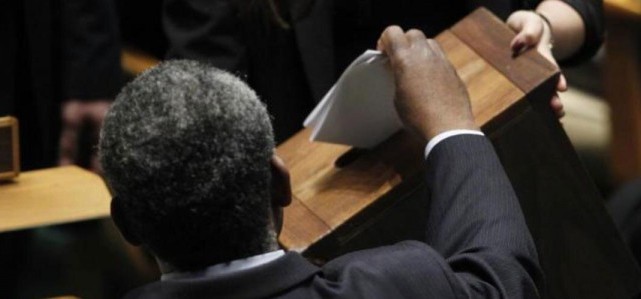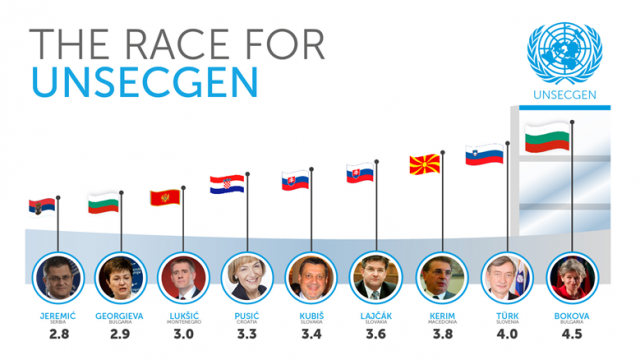Andres Oppenheimer of the Miami Herald has caused a bit of stir this week with his column about a short Brazilian gossip item suggesting that President Luiz Inácio Lula da Silva of Brazil may be seeking to run against Ban Ki-Moon for the post of UN Secretary General in 2011.
The short news item, in its entirety, from the news and gossip column Radar in the Brazilian weekly magazine Veja:
Na ONU?
A mais de uma pessoa Lula disse que foi sondado para se candidatar a secretário-geral da ONU em 2011.In the UN?
To more than one person Lulu said he was sounded out as a candidate for Secretary-General of the UN in 2011.
One of these individuals who may have encouraged Lulu to run is Sérgio Cabral Filho, governor of Rio de Janeiro.
O governador do Rio de Janeiro, Sérgio Cabral (PMDB), sugeriu nesta terça-feira o presidente Luiz Inácio Lula da Silva como candidato a secretário-geral da Organização das Nações Unidas (ONU) em 2011. Cabral e Lula participaram de evento de entrega de obras do Programa de Aceleração do Crescimento (PAC) na favela de Manguinhos, na zona norte da capital fluminense.
“Quando eu falo isso, os gringos ficam doidos, nós somos bons de voto, bons de campanha”, disse Cabral a respeito da possível indicação de Lula.
The governor of Rio de Janeiro, Sérgio Cabral (PMDB), suggested on Tuesday President Luiz Inácio Lula da Silva as a candidate for Secretary-General of the United Nations (UN) in 2011. Cabral e Lula participated in the event of delivery of works of Acceleration Program (PAC) in the slums of Manguinhos, in the north of Rio de Janeiro. “When I say that the gringos are crazy, we’re good to vote, good campaign,” said Cabral about the possible indication of Lula.
Oppenheimer notes that the “Brazilian government says it will not comment on the magazine’s report.” The news item however hinted at and Portuguese-language sources here and here report that Lula has mentioned his intention to seek the post to several close associates.
Oppenheimer’s take on the rumored interest misses by a mile however. He suggests that it could be Lula’s interest in the post that explains recent Brazilian foreign policy and that Lula could be “catering to an anti-U.S. climate at the United Nations” as a prelude to a campaign. Perhaps Oppenheimer is new to following global elections, but it’s not the U.S. that Lula needs to “anti-” if he wants a run at the post in 2011. Lula’s trips to Cuba and Iran may annoy the U.S., but they will do nothing, at best, for his chances at being UNSG.
Oppenheimer points out rather academically that Secretaries-General traditionally serve two terms and that “[m]ost diplomats say current Secretary General Ban Ki-moon…is expected to run for reelection” but fails to recall the barrage of criticism and leaked Norwegian memo last summer that challenged Ban’s likelihood of securing a second term.
With some dissonance to his earlier argument, Oppenheimer point outs that should Ban not receive a second term, Asian governments may insist that his successor also be Asian as it is regional groups rather than individual Secretaries-General that have traditionally served two terms. In 1996, Kofi Annan (of Kenya Ghana) was identified as an acceptable African successor to one-term Boutros Boutros-Ghali (of Egypt) for this reason, though Annan did go on to serve a second term of his own. In 2006, Asian governments were insistent that it was “Asia’s turn” at the post; the last Asian UNSG was U Thant in the 1960s. China was the key Security Council vote in this regard and may well use its veto in 2011 to ensure that Asia’s turn continues through the traditional two terms, even if Ban does not.
Rather than courting anti-U.S. sentiment at the UN, Lula’s opportunity to be a viable candidate next year would require him to maneuver against China by leveraging this practice of regional rotation both against and for his own run at the post. If he can make a case against a second Asian term as a given, he could pivot and then argue that it is now Latin America’s turn. This approach would bolster Oppenheimer’s suggestion that Brazil’s recent foreign policy is explained by Lula’s interest in the post, not in that it is “catering to anti-U.S. sentiment” but rather that it is laying the groundwork as he may be in using Brazil’s increasing influence to weaken Southern unity for the a second Asian term.
But the argument falls apart even then if Oppenheimer’s belief that Lula’s visits to Cuba and Iran would support a 2011 campaign. Lula’s only opportunity would be a successful anti-Asian (read “anti-China”) campaign that engages India and Japan rather than Cuba or Iran.
Oppenheimer might be right in that Ban will get his second term, if only because the type of campaign that he envisions Lula running would be an utter failure.





He can not speak neither Portuguese correctly will want to be secretary of the UN?
The ONLY presidents of Brazil who do not speak English were Lula and Dilma.
SHAME WORLD